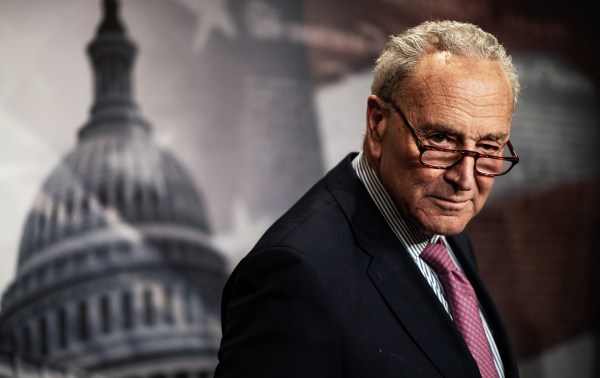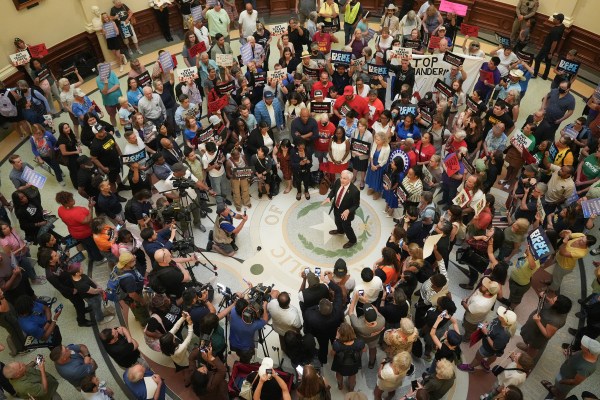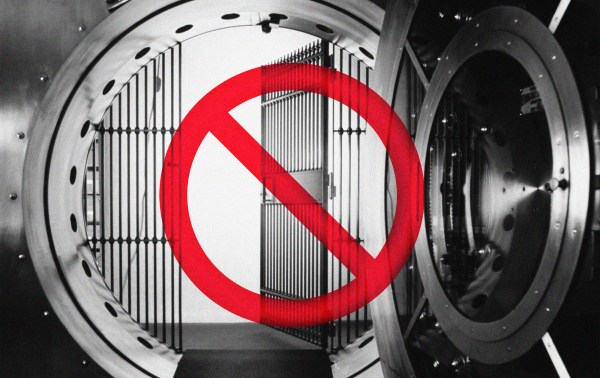That the Democratic Party’s multigenerational grip on the Jewish vote is slipping amid a shift toward President Donald Trump in 2024 is virtually conventional wisdom in Republican circles. The presumption is certainly not unfounded; it’s bolstered by credible exit and post-election polls. But Democratic strategists focused on Jewish voters insist otherwise.
Two prominent polls—Fox News’ exit polling and a post-election survey from the nonpartisan Pew Research Center—showed that Trump received about a third of the Jewish vote, an improvement over both of his previous White House contests. But the Jewish Democratic Council of America is unconvinced, pointing to data in a post-election poll fielded by GBAO, a Democratic firm with years of experience tracking Jewish voters. That poll pegged Trump’s 2024 share of the Jewish vote at 26 percent versus 71 percent for then-Vice President Kamala Harris.
“The Jewish vote has actually remained largely constant for the Democrat in presidential elections,” Halie Soifer, JDCA chief executive officer, told The Dispatch in a lengthy interview. “I don’t see this as a huge watershed for the Republicans in the 2024 election.”
Jim Gerstein, the GBAO partner who fielded the firm’s post-election survey of Jewish voters, noted that the survey’s finding of 71 percent support for Harris is in line with recent Democratic nominees, including Barack Obama in 2012 and Hillary Clinton in 2016, each of whom garnered 70 percent. He attributed differences between his poll and the Fox News and Pew Research Center surveys largely to methodology. He also credited Joe Biden’s 77 percent share of the Jewish vote in 2020 to Trump’s deep unpopularity in that contest.
Gerstein did concede some changing attitudes among this small but influential demographic from 2020 to 2024, however, noting that the October 7, 2023, Hamas terrorist attack in Israel increased the “emotional attachment” to the Jewish state among these voters. Rising Jew hatred and antisemitic violence in the United States also weighed heavily on American Jews as the election approached. And so Gerstein, who conducted his poll for J Street, a liberal Jewish organization often critical of Israel, said he was on guard for signs of increased support for Trump among Jewish voters.
“So, October 7, all these changes, all these concerns [raise] the very legitimate question: Is this, in fact, the year that the Jewish vote is going to change? Is there going to be something different there? And we measured this quite extensively,” Gerstein said. “And what we found in the 2024 election was that it was pretty much the exact same.” If he’s right, Harris experienced no material defection of Jewish voters compared to recent Democratic nominees.
But Sam Markstein, a spokesman for the Republican Jewish Coalition, the counterpart to the JDCA and, as The Dispatch reported in July, a group that has come to occupy rarified air inside the GOP, said it was “laughable” that Gerstein puts more stock in his numbers than Pew and others. (Gerstein explained his surveys sample Jewish voters who don’t consider themselves religious Jews but do consider themselves Jews culturally and/or ethnically, a more expansive metric not all pollsters employ.)
“Every reputable outlet that clearly showed a dramatic increase in Jewish support for President Trump and Republicans in 2024,” Markstein said. “Instead of whistling past the political graveyard, JDCA should focus on repairing the damage being done by the Democrats to the U.S.-Israel relationship.”
The debate over just how many Jewish voters turned toward the Republican Party in 2024 raises an interesting question regarding the JDCA: If Jewish voters are as reliably Democratic as the group believes they are, if their support for Democrats isn’t in doubt following the criticism of Israel by some outspoken Democrats and liberal activists after October 7 and the near unanimous support for the Jewish state coming from Trump and congressional Republicans—what purpose does the JDCA serve?
“It’s a really good question,” Izzy Klein, co-chairman of the JDCA’s political committee on the group’s board of directors, acknowledged in an interview with The Dispatch this month. “When we set up the organization eight years ago, and we’re sort of talking in the anniversary month of our creation, we felt like there was not a consistent voice for Jewish Democrats in politics outside of the presidential campaign cycles, and that was a problem.”
Klein and Soifer were both adamant that Democrats are not in danger of losing Jewish voters to the Republicans, and Klein was hesitant to name any specific problems the JDCA was created to address, saying simply that Democrats cannot take Jewish support for granted. “You’ve got to tend to your garden,” he explained. (On domestic policy matters, Klein and Soifer are on solid ground. Most American Jews have center-left sensibilities on fiscal and social issues, predisposing them to vote for Democrats.)
Democratic Majority for Israel, a party-aligned group that doesn’t hesitate to call out Democrats critical of the U.S.-Israel alliance, backed JDCA claims that a healthy majority of Jewish voters remain firmly in the Democratic camp. “There is no question that this is a serious moment in the U.S.-Israel relationship but despite these circumstances, we know that the fundamentals of our party’s support for Israel are strong,” DMFI president and CEO Brian Romick said in a statement provided to The Dispatch. “Nearly all Jewish voters describe themselves as pro-Israel, and most of them supported the Democratic nominee for president in the last election.”
But as separate conversations with Klein and Soifer progressed, both seemed to suggest the JDCA serves a more integral purpose: to ensure there is a pro-Israel voice inside the party to guarantee it remains a bastion of support for U.S. diplomatic and military aid to Israel and ultimately, to maintain Jewish voters’ high level of support for Democratic candidates that precedes Israel’s 1948 founding. That would appear to be an admission of political vulnerability.
“We also need to do the work of reminding Democrats, candidates and members [of Congress,] of what’s important to Jewish voters, and that protecting democracy here and abroad and fighting antisemitism, supporting the independent state of Israel, gun control, climate, all of these things are values that Jewish voters hold dear and want to continue fighting for,” said Klein, a former communications aide to Senate Minority Leader Charles Schumer of New York, the highest-ranking Jewish lawmaker on Capitol Hill.
“Some of that,” Klein added, “requires, I think, a little bit of education and dialogue, and I think that’s true across the board. But it’s particularly true among younger generations of politicians and candidates who are running for office.”
Indeed, while the majority of congressional Democrats back U.S. military and diplomatic support for Israel, the size of that majority has shrunk post-October 7, as the party’s liberal base has voiced opposition to Jerusalem’s prosecution of the war in Gaza.
In late July, amid accusations from Israel’s critics that the country’s war effort is causing starvation among the Palestinians who live in Gaza, a majority of Senate Democrats supported two proposals from Sen. Bernie Sanders, a Vermont independent who is Jewish, to block U.S. weapons sales to Jerusalem. (The legislation failed amid broad Republican opposition.) But it’s not just younger progressive activists and lawmakers—like Reps. Alexandria Ocasio-Cortez of New York, Ilhan Omar of Minnesota, and Rashida Tlaib of Michigan, among others—who are worrying the JDCA.
Zohran Mamdani, New York City’s Democratic nominee for mayor and the prohibitive favorite in this fall’s election, refuses to recognize Israel’s right to exist as a Jewish state and has only tepidly backed away from his embrace of “globalize the intifada,” a phrase with violent antisemitic overtones. The JDCA said it does not get involved in mayoral contests. But Soifer reiterated the group’s concerns about Mamdani while stopping short of urging voters to back one of the three independents on the November ballot.
“We strongly disagree with Mr. Mamdani’s views on Israel and have expressed concern with his defense of the phrase ‘globalize the intifada,’ which we see as a green light to violence targeting Jews,” Soifer said. “If he wants to be mayor of the largest Jewish population of any city outside of Israel, he must demonstrate a clearer commitment to combating antisemitism.”
The JDCA hasn’t been alone in worrying about the direction of the Democratic Party, vis-à-vis Israel.
In 2019, DMFI joined the fray to remind (or is it convince?) Democratic incumbents and candidates that backing U.S. aid for Israel is good politics, despite rumblings to the contrary from the party’s base. Gerstein confirmed the issue factors into how Jews vote. “Candidates need to pass a threshold of credibility on Israel,” he said. “Criticism of Israel is just—people are okay with it … It’s just that [questioning Israel’s] right to exist is a red line.”
The JDCA was founded in 2017 by Democratic former Rep. Ron Klein of Florida, and others, replacing the defunct National Jewish Democratic Council, which folded the previous year. The JDCA became operational in June 2018 when Soifer joined the group as its first employee.
As CEO, she runs the organization and its full-time staff of at least 13 and oversees strategy. There are regional chapters located across the U.S., aimed at mobilizing Jewish support for Democratic candidates in various states, periodic virtual organizing events and in-person fundraisers, and an annual conference attended by prominent Democrats.
The JDCA’s influence inside the party is unclear. The group’s political expenditures in the 2024 election cycle, Soifer said, were a modest $2 million, although the goal is to spend more in 2026. But the JDCA does vet—via interviews and a questionnaire—and endorse candidates, looking for those with an ironclad commitment to supporting U.S. military and diplomatic aid to Israel, to influence federal policymaking, and working to maintain this position in the party’s platform.
On candidate endorsements: Soifer said the group gets involved in House and Senate races, and some gubernatorial contests (including this November, in New Jersey and Virginia), but only where some significant portion of the electorate is Jewish. If the JDCA concludes there’s a candidate worth backing and that its involvement can make a difference, the organization jumps in. That includes in Democratic primaries, as the JDCA did in 2024 to oppose incumbent Reps. Jamaal Bowman of New York and Cori Bush of Missouri. Both lost renomination to pro-Israel Democrats.
As with Bowman and Bush, the JDCA’s active opposition is typically sparked by the target’s hostility to Israel. “We are discerning and while we only support Democrats we do not support all Democrats,” Soifer said. “They have to align with us on every key issue—domestic and foreign policy—related to [and including] of course, Israel.” Soifer did not rule out moving to oust anti-Israel Democrats in primaries in 2026, Omar and Tlaib among them, but said it would depend partly on viable challengers emerging.
On the party’s platform: Soifer volunteered that she was “the only Jewish organizational voice to testify before the Democratic Party platform committee meeting” in August of last year, urging Democratic National Committee leaders to maintain a muscular commitment to the U.S.-Israel alliance in the document. The platform committee ultimately rebuffed demands from some anti-Israel grassroots activists to insert support for slapping the Jewish state with a U.S. arms embargo.
But it looks like Soifer and the JDCA have more work to do. Semafor’s David Weigel reports that progressive DNC members are preparing to introduce a resolution targeting Israel at a business meeting in Minneapolis later this month. The proposal for a change in DNC policy revives calls for an arms embargo, declares support for suspending military aid and urges “elected members of Congress to recognize Palestine as a country.” Soifer denounced the proposal.
“As Jewish Democrats who care deeply about Israel’s security, surging humanitarian aid into Gaza, and bringing home the 50 hostages held by Hamas, we strongly oppose any effort calling for an arms embargo on Israel while failing to even mention, let alone condemn, Hamas terror and the continued captivity of 50 hostages,” she said. “A short-sighted resolution that calls for the complete suspension of military aid to Israel does nothing to bring home the hostages, alleviate the humanitarian crisis in Gaza, or end this war.”
The rise in rancor directed toward Israel and the questioning of Washington’s alliance with Jerusalem are not exclusive to the American left, particularly among younger voters. Podcasts hosted by populist personalities Tucker Carlson and Candace Owens are two easy examples of this dynamic on the right. Jamie Weinstein’s recent Dispatch Podcast interview with Curt Mills, executive director of The American Conservative, is another.
But there are some circumstances unique to the left that have unsettled Jewish voters. The rash of student protests on college campuses in the aftermath of the October 7 attacks showed young progressives who opposed the war in Gaza sympathizing with Hamas and targeting fellow Jewish students and American Jews generally, despite their lack of affiliation with the Israeli government. These protesters embraced phrases like “globalize the intifada” and “from the river to the sea,” a call to wipe Israel off the map.
Soifer gingerly acknowledged the rift over Israel inside the Democratic Party and admitted it’s concerning, offering that Trump’s presence on the ballot might have masked Jewish voters’ discontent with the Democratic Party.
“There is another factor that needs to be considered, and that is, on the Republican side, they’ve run the same candidate in the past three [presidential election] cycles and Jews overwhelmingly despise him. It could have been very different with a different Republican, to be totally honest,” she said.
Her explanation for younger Democrats’ turn against the Jewish state is Netanyahu, a polarizing figure in American politics who, at this point in his long career in Israeli politics, is identified as an ally of Trump and the Republican Party. Older Democrats can look back on several Israeli prime ministers—some they liked, some they didn’t. For Democrats 30 and younger, Netanyahu has been prime minister most of their lives, having served in the post from 1996 to 1999; 2009 to 2021, and after a brief pause, again since 2022.
“This is something we’re grappling with and we have increased our engagement with younger voters,” Soifer said, pointing to the JDCA’s creation of a task force to address younger Democrats’ rejection of Israel, including on college campuses. “Once this crisis in Gaza hopefully dissipates soon, and this war ends, I think that we will see less of a split in the party and we will go back to the historic support for Israel.”
Klein was a bit more circumspect.
Recall: Gerstein said Democrats running for office need to meet a basic threshold of credibility as committed supporters of the U.S.-Israel alliance, after which Jewish voters then decide whom to support based on domestic issues (on which they are deeply aligned with the party). Democratic presidential nominees have always passed that test, but that streak is seemingly in danger of ending in 2028 as prominent White House contenders hedge on their support for Israel, wary of alienating a liberal base angry with the Jewish state over its perceived conduct of the war in Gaza.
So The Dispatch asked Klein: Is he worried that the number of Democratic skeptics-bordering-on-hostile critics of Israel is growing, such that more and more Jewish voters may, over time, come to view the party as inhospitable? After a pregnant pause of roughly 10 seconds, Klein answered. “I worry about everything.”










Please note that we at The Dispatch hold ourselves, our work, and our commenters to a higher standard than other places on the internet. We welcome comments that foster genuine debate or discussion—including comments critical of us or our work—but responses that include ad hominem attacks on fellow Dispatch members or are intended to stoke fear and anger may be moderated.
With your membership, you only have the ability to comment on The Morning Dispatch articles. Consider upgrading to join the conversation everywhere.